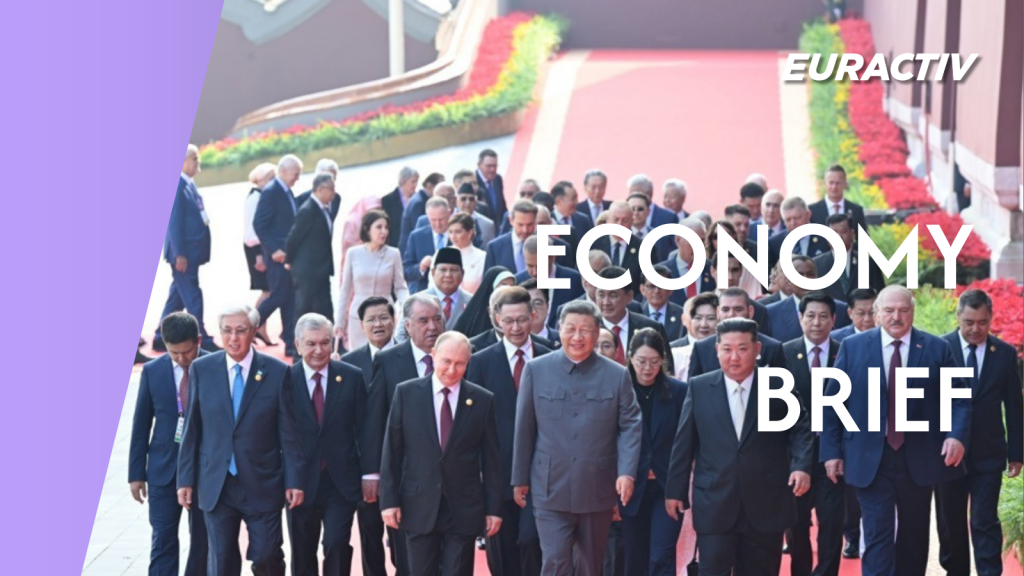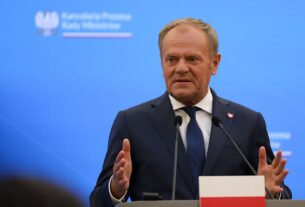The EU’s Ukraine policy is currently underpinned by two key beliefs. First, Vladimir Putin is a predatorial, rapacious ogre who is hell-bent on destroying the EU. Second, this monster should agree to meet Volodymyr Zelenskyy – whose country he is viciously attacking – and sign a lasting peace agreement (presumably, using his claws).
Barring a scenario in which Putin is like Shrek – who, despite his ogreish nature, is still fundamentally moral and amenable to rational argument – both claims cannot be true: If Russia’s leader is a beast rattling the gates of Europe, then he must be defeated on the battlefield, not debated at the negotiating table. (Shrek, it’s worth recalling, only wanted to keep his swamp – not expand it.)
Indeed, up until a few months ago European leaders themselves were adamant that the Gremlin in the Kremlin must be vanquished militarily. Kaja Kallas, the EU’s top diplomat, said in December that the EU will do “whatever it takes” for Ukraine to “win” the war; Latvia’s President, Edgars Rinkēvičs, went even further, calling for Russia to be “destroyed”.
Even a temporary cessation of hostilities was deemed unacceptable. EU chief Ursula von der Leyen – who, like Zelenskyy, has repeatedly called for a ceasefire in recent weeks – warned in 2023 that “a ceasefire would be inherently unstable and would destabilise the region along the contact line”. Zelenskyy himself rejected calls for a ceasefire as recently as March this year.
What is going on? Why is Europe’s current messaging so contradictory? And why are European leaders contradicting their own proposals from just a few months ago?
The answer can be summarised in just two words: Donald Trump.
Since returning to the White House in January, the self-described “peacemaker” (and would-be Nobel Peace Prize-winner) has sought to strong-arm Kyiv and Moscow into ending the conflict, which he argues (not entirely unreasonably) has destroyed countless lives, pushed the world to the brink of nuclear war, and strengthened China – Washington’s real geostrategic nemesis.
Faced with this orange-tinted menace, EU leaders basically had two choices: support Trump’s ‘peace initiative’ (that is, his late-night Truth Social posts and hastily convened summits), or openly defy The Donald by continuing to push for Russia to be militarily defeated.
Both options entailed significant risks. The first would likely have resulted in Kyiv making significant territorial concessions and abandoning its NATO membership aspirations – in other words, its capitulation. The second could have prompted Trump to slap even more punishing levies on the EU, and, in the worst-case scenario, led to a US military withdrawal from Europe.
Abhorring both options, EU leaders sought to square what was, admittedly, a grotesque circle: they claimed to support Trump’s peace initiative, whilst actually doing nothing to advance it. Moreover, under the (negotiating) table, leaders crossed their fingers that Trump would eventually blame his initiative’s failure on Moscow – thus triggering a fresh wave of Western sanctions that would, they hoped, bring the Russian bear to its knees.
Doomed from the outset
Alas, this plan, unlike the other two, was always destined to fail.
The problem is not just that EU leaders have unwittingly revealed their hand by (repeatedly) lobbing personal insults at Putin – behaviour which even Trump, in his dim-witted, ogreish way, understands isn’t exactly conducive to diplomacy.
Rather, the problem is that economic pressure alone was never going to force Moscow to back down.
The reasons for this are simple. After more than three years of war, the EU and the US have already exhausted their options for imposing severe economic penalties on Moscow. Indeed, as I write this, EU diplomats are scrambling to figure out what the bloc’s 19th (yes, nineteenth) sanctions package could possibly target.
This, in turn, means that the only way to further “pressure” Moscow economically is through secondary sanctions – that is, measures that don’t target Russia directly, but the countries it trades with.
But as events at this week’s Shanghai Cooperation Organisation in Tianjin underscored, these measures also face an insurmountable problem: too many countries, and in particular the world’s most populous ones, China and India, are steadfastly refusing to cut ties with Moscow.
“Always a delight to meet President Putin!” Indian Prime Minister Narendra Modi wrote on social media after meeting his Russian counterpart at the Eurasian forum.
Chinese President Xi Jinping was even more effusive, claiming that the links between Russia and China have “become an example of major-country ties” after announcing a major new Russian gas pipeline project through Mongolia. (Xi even discussed at one point how he and Putin could ensure their immortality by harvesting human organs – comments that even Shrek, who only ever claimed to eat human spleens, would likely find excessively gruesome.)
Delhi delight
The fact that the West has essentially no leverage over China – which, in addition to being the world’s largest economy measured by purchasing power parity, is also Russia’s largest trading partner – should always have been obvious.
But in case it wasn’t, we were offered a sharp reminder in April, when Trump, the world’s greatest (trade) troll, attempted to club China into submission using his favourite weapon (tariffs). After Beijing tightened its chokehold over the global supply of strategically critical minerals, Trump quickly backed down – and never tried again.
Playground bully that he is, Trump subsequently redirected his wrath towards a (perceived) weaker victim: India. Hence his announcement last month of the world’s inaugural “secondary tariffs” on New Delhi, which aimed to “punish” India for purchasing Russian oil – despite the fact that China, not India, is the world’s largest importer of Russian fossil fuels.
The 25% levy – which comes on top of a previous 25% “reciprocal” duty – was hailed by EU officials. Trump also claimed the move “probably” prompted Putin to agree to meet him in Alaska.
Predictably, this plan also totally backfired.
Not only is an enraged Modi now reportedly refusing to take Trump’s phone calls, but India has actually pledged to increase trade and economic ties with Russia. Adding insult to injury, Modi and Putin warmly embraced in front of the world’s cameras this week – while Trump impotently warned countries against “conspiring” against the US.
Ominous signs
Undoubtedly, this week’s events in Tianjin constitute an enormous geopolitical defeat for the US – and a personal humiliation for Trump. But they also present serious dangers for Europe.
This is for two reasons.
The first is that Trump, after failing to force India and China to stop purchasing Russian oil, is now likely to direct his ire toward Europe – which, despite its sanctions, continues to import non-negligible quantities of Russian energy.
The second is that Trump could ultimately decide that it is Europe, and not Russia, that is responsible for the inevitable failure of his peace initiative – a possibility that, apparently, EU leaders never bothered to consider.
Ominously, there are signs that both of these dangers might be crystallising.
Citing unnamed “senior White House officials”, Axios reported earlier this week that Washington is “losing patience with European leaders” for refusing to push Zelenskyy into making territorial concessions.
The news outlet also noted that Washington is now, somewhat ironically, pressuring Europe to cease purchases of all Russian fossil fuels and impose secondary tariffs “on India and China, similar to those already imposed on India by the US” – moves which would likely devastate Europe’s mineral-hungry manufacturers and scupper Brussels’ push to clinch a free trade deal with New Delhi by the end of this year.
“America has no permanent friends or enemies, only interests,” Henry Kissinger, one of the world’s greatest (and smartest) human monsters, once said. This week’s events surely underscore this point.
But they also highlight another fundamental truth that should be familiar to lovers of a different, fictional monster: that the job of a genuine friend is to tell someone when they don’t have any.
Economy News Roundup
EU to boost trade links with Asia. Maria Martin-Prat, deputy director-general at the Commission’s trade division, said on Wednesday that Brussels plans to finalise trade deals with India and Indonesia by the end of 2025. She also noted that Brussels is “engaged very actively” to boost ties with a range of Southeast Asian countries, including the Philippines, Malaysia, and Thailand. “There are reasons that are pressing that have developed in the last month that make for us very clear that the relationship with Asia is particularly important,” Martin-Prat said, in a thinly veiled reference the EU-US trade deal and growing tensions with China. Her remarks came just hours before the Commission, which oversees EU trade policy, unveiled the official texts of its trade deals with Mexico and the Mercosur bloc of Latin American countries, which includes Brazil and Argentina. Read more.
The European Commission fiercely defends EU-US trade deal. In an often heated special hearing of the European Parliament’s trade committee on Wednesday, MEPs from across the political spectrum denounced the July “framework agreement” between Washington and Brussels. “Listening to this debate, I have the impression that you want to give us the responsibility for the US tariff policy,” said Sabine Weyand, director-general at the Commission’s DG Trade, to audible groans from MEPs. Weyand added that, unlike other US trading partners, the EU’s 15% duty is not “stacked” on top of previous levies and that Washington also agreed to provide tariff exemptions for key EU exports, including aircraft and generic pharmaceuticals. Read more.
Brussels’ US investment and purchasing pledges can’t be fulfilled, says top EU lawmaker. Bernd Lange, chair of the Parliament’s international trade committee, told reporters on Wednesday that the bloc’s promise to buy $750 billion worth of US oil, gas and nuclear energy is “totally unrealistic”, adding that it is similarly “not possible” for Brussels to force EU firms to invest $600 billion into the US over the next three years. Both promises are central to July’s EU-US framework agreement, which slaps most EU exporters to the US with a 15% minimum levy. The veteran MEP’s remarks are corroborated by analysts, who also note the EU’s investment and purchasing pledges cannot be legally enforced by Brussels. The bloc bought $76 billion worth of American fossil fuels and invested $150 billion in the US in 2024 – far short of the new commitments. Read more.
Italy considers invoking EU defence spending clause. Activation of the so-called “national escape clause” would allow the bloc’s third-largest economy to ramp up defence spending by up to 1.5% of annual GDP without being formally reprimanded by the European Commission. The move, which people familiar with the matter say is being considered by Rome, would represent a remarkable reversal by Prime Minister Giorgia Meloni’s far-right government, which has repeatedly ruled out making use of the provision – a key pillar of EU chief Ursula von der Leyen’s €800 billion rearmament plan. Italy is already subject to a so-called “excessive deficit procedure” (EDP) for exceeding the EU’s 3% fiscal limit. Italian officials have previously expressed concern that invoking the clause could keep Italy stuck in an EDP, which Rome is desperate to exit to reassure investors about the country’s fiscal trajectory. Read more.
Trump’s attempts to control Fed poses “a very serious danger”, says Lagarde. The European Central Bank president’s comments came after Trump’s shock decision to fire US Federal Reserve Governor Lisa Cook last week for alleged mortgage fraud. Cook – who has refused to resign – is a close ally of Fed chair Jerome Powell, whom Trump has repeatedly criticised for refusing to slash interest rates since Trump’s return to the White House in January. Speaking to French radio on Monday, Lagarde also expressed “concern” about the impact of Paris’ political turmoil on the eurozone economy, with premier François Bayrou expected to lose a confidence vote on 8 September amid widespread opposition to his deficit-slashing budget. Lagarde, however, downplayed fears that a French government collapse – which would be the third in a year – could trigger a repeat of last decade’s eurozone crisis. “I believe that the French banking system [is] in better shape than it was during the last major financial crisis, that it is well-structured, well-supervised, and has responsible players,” she said. Read more.





